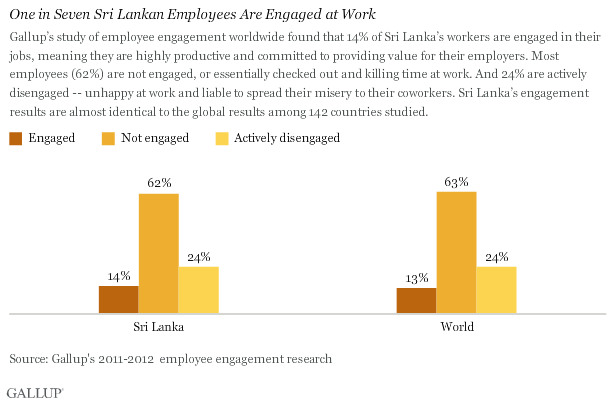High attrition and absenteeism among Sri Lanka's manufacturing employees are alarming indicators of a disengaged workforce.
Sri Lanka has the opportunity to become a significant economic force in South Asia. Since the 25-year civil war ended in 2009, the island nation has taken steps to begin competing on a regional and global level. Economic ties with China, rising foreign investment, and major increases in tourism have greatly improved the country's macroeconomic situation following the conflict, leading the World Bank to upgrade Sri Lanka from a low-income to a lower-middle-income country in 2010.
Sri Lankan leaders are now searching for sources of continued economic growth to avoid the "middle income trap." In this scenario, wages rise enough to make manufacturing exports less competitive, but the economy does not advance enough to produce higher-value products, which would help Sri Lankans progress to high-income status.
For Sri Lanka's leaders to succeed, the country's employees must become much more engaged at work. Gallup's 2011-2012 study of employee engagement worldwide found that just 14% of the country's workers are engaged in their jobs, meaning they are highly productive and committed to providing value for their companies. Most of Sri Lanka's employees -- 62% -- are not engaged, or essentially checked out and killing time at work. And 24% are actively disengaged -- unhappy at work and liable to spread their misery to their coworkers. These figures are almost identical to the global results among 142 countries studied. (For complete results, download the State of the Global Workplace report).

Maximizing the productivity of Sri Lanka's workforce
Addressing the engagement problem is critical because Sri Lanka's stock of human capital is its most vital asset. The population is relatively healthy and well-educated for a developing country, with average life expectancy at 75 years and a literacy rate of 91% among adult Sri Lankans. Business leaders in Sri Lanka are investing heavily in upgrading companies' policies, processes, and technologies, but among their foremost concerns should be maximizing the productivity of the country's workforce. Specific goals should include:
- Invest in employees' skill development: Business leaders in Sri Lanka should be concerned with continually upgrading the skills of their workforce. That means putting pressure on the government to raise the quality and accessibility of education to improve the recruitment pool -- but also developing skills-training opportunities for current employees.

Speaking at a convention of Sri Lankan bankers in October, Duvvuri Subbarao, Ph.D., former governor of the Reserve Bank of India, noted that at a certain point in their development, "the inability to improve the productivity of labor and innovate technology is what puts countries in the middle income trap." Investment in training and innovation and in building a highly engaged labor force can increase the likelihood that middle-income countries will gain the momentum they need to avoid the trap and stay on the path toward greater prosperity.
Managers can play a pivotal role by focusing on the development of each individual employee, helping address a question that represents the highest level of engagement: How do we grow together? Slightly more than one-fourth of Sri Lankan employees strongly agree that there is someone at work who encourages their development. This level is relatively high for a developing country, and it may be particularly likely to help the country advance its growth if leaders and managers focus on improving it further. - Focus on engagement in the manufacturing sector: Though Sri Lanka is currently experiencing a services boom, it's essential that the country not overlook the importance of manufacturing. A recent study by the Asian Development Bank found that the probability of becoming a high-income economy is just 5% in countries without a robust manufacturing sector.
Across South Asia, only 7% of manufacturing and production workers are engaged. And high attrition and absenteeism among Sri Lanka's manufacturing employees are alarming indicators of a disengaged workforce. Prioritizing workers' engagement will boost their productivity and positively influence other key business outcomes, such as reducing safety incidents and quality defects. Such gains may help companies increase capital investments in new manufacturing technologies, fostering greater productivity in the sector. - Make the link between workplace and well-being: Gallup categorizes individuals' overall well-being as "thriving" (strong, consistent, and progressing), "struggling" (moderate or inconsistent), or "suffering" (at high risk). In 2012, just 4% of Sri Lankan employees rated their lives highly enough to be considered thriving -- one of the lowest among workforces worldwide. Employees' workplace experiences have a considerable impact on how positively they evaluate their lives, and that positivity in turn helps sustain their engagement at work.
Interventions intended to promote employees' well-being in a variety of realms -- health, financial management, and social connections, among others -- can help maintain the virtuous circle between engagement at work and well-being in life. Gallup researchers have learned that devising programs to simultaneously promote employees' overall well-being and their workplace engagement boosts employee engagement levels more dramatically than focusing on engagement alone.
Business leaders should consider the role of workplace conditions not only for the good of their company, but also to help boost productivity and job creation. This will contribute to the fight against poverty and help increase the standard of living for all Sri Lankans.
